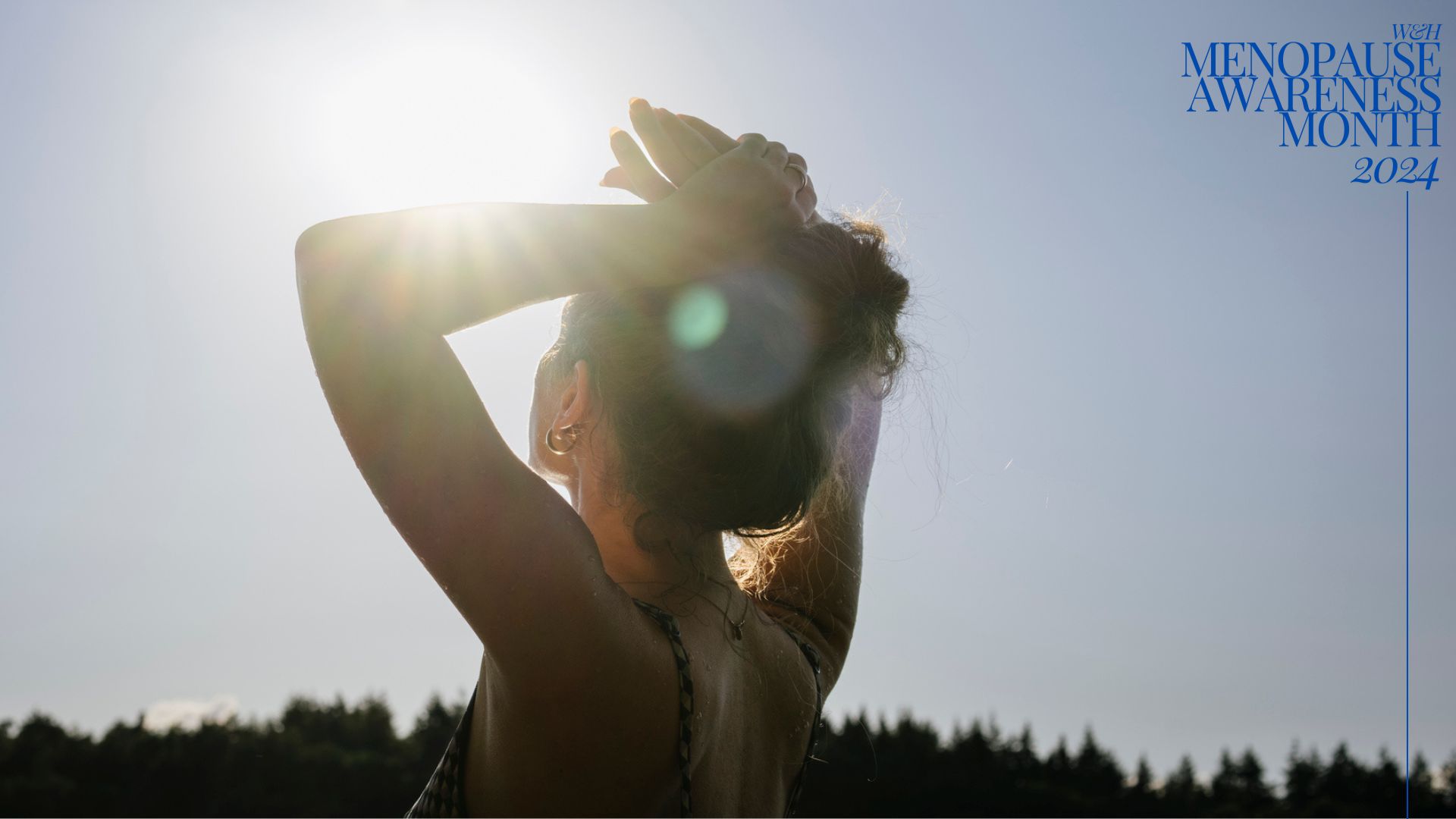No, PCOS doesn't 'go away' after menopause - plus the other myths you need to know about
PCOS and menopause are rarely discussed, yet it could affect 1 in 10 women in the UK. Here, Health Writer Sarah Finley reveals what you need to know


Sign up to our free daily email for the latest royal and entertainment news, interesting opinion, expert advice on styling and beauty trends, and no-nonsense guides to the health and wellness questions you want answered.
You are now subscribed
Your newsletter sign-up was successful
Want to add more newsletters?

Daily (Mon-Sun)
woman&home Daily
Get all the latest beauty, fashion, home, health and wellbeing advice and trends, plus all the latest celebrity news and more.

Monthly
woman&home Royal Report
Get all the latest news from the Palace, including in-depth analysis, the best in royal fashion, and upcoming events from our royal experts.

Monthly
woman&home Book Club
Foster your love of reading with our all-new online book club, filled with editor picks, author insights and much more.

Monthly
woman&home Cosmic Report
Astrologer Kirsty Gallagher explores key astrological transits and themes, meditations, practices and crystals to help navigate the weeks ahead.
Together, PCOS and menopause are rarely discussed. While we are getting better at talking about female health conditions like these, the combination of PCOS with menopause often slips under the radar - and it can be a confusing and difficult time for many.
PCOS is a hormonal disorder affecting 1 in 10 women (about 3 million people) most typically during the reproductive years. A mixture of hormonal imbalances, insulin resistance, and/or genetic factors causes it - so what happens when you bring perimenopause into the mix?
Symptoms of menopause can include hot flushes, night sweats, insomnia, low mood, anxiety, and changes to your sex drive. If you deal with PCOS as well, adding these symptoms to the mix can feel daunting - especially with so many myths around PCOS and menopause. Here, woman&home speaks to gynaecologists and doctors specialising in women's health and PCOS to dispel the myths and reveal how to manage your symptoms as you navigate menopause and PCOS together.
PCOS and menopause: The myths
PCOS disappears after menopause
Sadly, it's not true that PCOS magically vanishes when you hit menopause. Some symptoms of PCOS, like irregular periods, won't be a problem post-menopause but the underlying hormonal imbalances don’t just go away. Even after menopause, you may still deal with high levels of androgens (male hormones) and insulin resistance, which can lead to health conditions like diabetes or heart disease.
“While some symptoms of PCOS and menopause may overlap, making it difficult to distinguish between them, it’s crucial to understand these nuances,” explains Jodie Relf, a PCOS dietician who works with MyOva.
“Recognising and adapting to the changes during the transition to menopause can help women manage their symptoms better and reduce the risk of developing serious health conditions like diabetes, hypertension [high blood pressure], and cardiovascular disease.”

Jodie Relf is a UK-registered dietitian who has specialised in Polycystic Ovarian Syndrome (PCOS) for over six years. With more than thirteen years of diverse experience in dietetics, she has established herself as a leading expert in her field. Jodie serves as a media spokesperson for the British Dietetics Association and has been featured in national media publications.
PCOS causes early menopause
While many people think that PCOS causes earlier menopause, that's not always the case. It's very personal, says Relf, but research shows that women diagnosed with PCOS typically enter menopause later.
Sign up to our free daily email for the latest royal and entertainment news, interesting opinion, expert advice on styling and beauty trends, and no-nonsense guides to the health and wellness questions you want answered.
Friends a similar age to you may start to experience perimenopause symptoms in their early 40s, as is typical, but you could be a little further behind. This can be confusing, the dietitian says. “This delay can make it more challenging to recognise the onset of menopause, as PCOS symptoms can mask its early signs.”
However, "the experience of PCOS during menopause can vary widely among women", she says. "The symptoms of PCOS and menopause can be managed and minimised through making lifestyle changes."
You can't be diagnosed with PCOS in menopause
PCOS can be difficult to identify even when you’re not going through menopause - with one new study led by Philips Lumea revealing that 72% of women experience at least one of the signs of PCOS without knowing it could be linked to the condition. Weight gain (24%), acne and oily skin (17%) and excess hair growth (10%) are the most common.
So PCOS can be even more difficult to spot during menopause or perimenopause due “to the similarities in symptoms. This can also mean it’s difficult to spot symptoms of perimenopause if you already have PCOS,” explains Dr Shirin Lakhani, a GP and menopause and hormone expert.
Yet, just because it can be more difficult to spot the signs of PCOS during perimenopause doesn't mean you can't be diagnosed with PCOS. “Look out for any new symptoms you don’t recognise, as well as irregular or missed periods, fertility problems, mood swings, difficulty sleeping, hair loss, unwanted hair growth, or weight gain. These can all be symptoms related to PCOS or perimenopause unfortunately, so you just have to be aware of your own body and what feels right and normal for you, especially if you are over the age of 40," she says.

Dr Shirin Lakhani MBBS MRCGP DRCOG is a GP, aesthetic physician, an award-winning cosmetic doctor, and the founder of Elite Aesthetics, with a significant voice of authority within the women's health space.
HRT can help PCOS in perimenopause
Hormone replacement therapy (HRT) is a treatment used to replace female hormones (estrogen and progesterone) that women produce less of when they go through menopause.
However, it's important to speak to your doctor before deciding on HRT. When you also have PCOS symptoms, your needs and symptoms could be different. Valentina Milanova, the founder of Daye, a gynaecological health research and development company, says: “While HRT can help manage menopausal symptoms like hot flashes and vaginal dryness, those with PCOS may have unique considerations.
“Since PCOS is associated with higher androgen levels, some women may not experience the same severity of oestrogen-deficiency symptoms during menopause. Additionally, PCOS increases the risk of cardiovascular disease and metabolic issues, so the potential risks and benefits of HRT should be weighed individually," she says. "A healthcare provider may recommend lower doses or different formulations of HRT for women with PCOS to balance symptom relief with minimising risks."
Can PCOS symptoms get worse in menopause?
While PCOS does not necessarily worsen the menopausal transition, it is associated with a higher risk of developing type 2 diabetes, hypertension, and cardiovascular disease, explains Relf. “This is due to the prolonged exposure to inflammation, insulin resistance, and abdominal weight gain that often accompany PCOS.”
While symptoms of depression and anxiety in menopause are unfortunately common, they can also intensify in those who also have PCOS. "The compounded impact of emotional and physical symptoms can make the menopausal period particularly challenging for women with PCOS," she says.
How to manage PCOS in menopause
Dietary changes
Getting enough protein via high-protein foods such as chicken, eggs, and tofu, can help to “improve insulin sensitivity. Plenty of fruits, vegetables, and whole grains will help to prevent dyslipidemia, improve blood glucose levels and reduce inflammation," says Relf.
Foods to avoid include anything that could cause further inflammation. For example, research from the University of Lublin has shown that ultra-processed foods (UPFs) - foods that are far from their original state after being altered in a factory - plus red meat and saturated fats can contribute towards raised levels of bodily inflammation.
Swap saturated fats for omega-3 fatty acids and UPFs for whole foods, which are rich in antioxidants.
A good exercise routine
Dr Haleema Sheikh, a hormone specialist at the Marion Gluck Clinic, says PCOS and menopause symptoms may make us feel like not doing any exercise but "any type of movement is beneficial to manage symptoms and improve our mental wellbeing".
She recommends Pilates, brisk walking, jogging, and swimming as a workout. "Strength training is also beneficial for lowering insulin resistance and speeding up metabolism," she says, as well as contributing to muscle mass maintenance, which lowers the risk of conditions like osteoporosis in turn.
"Weights are essential for maintaining bone density as you go through the menopause tradition," Relf agrees. "Regular exercise can also play a crucial role in mental wellbeing during this challenging and emotional time."
With over 16 years of experience in the NHS as a GP, Dr Haleema Sheikh has a wide breadth of knowledge in dealing with women’s health issues such as endometriosis, PCOS, PMS, perimenopause and menopause. She has also completed the Diploma of Faculty of Sexual and Reproductive health and is well-versed in hormonal contraception and fertility matters.
An established sleep routine
Menopause will bring new symptoms that could cause havoc with your sleep - including night sweats and hot flushes.
However, Dr Sheikh explains that establishing a sleep routine and learning how to sleep better can help. This starts with creating a “consistent schedule, even during weekends and holidays,” she says. Research from the University of Houston suggests that if we go to bed and wake up at the same time every night, we'll wake up naturally at the same time every day too.
Getting better sleep also means "getting at least eight hours a night", she says. "Avoiding rich, fatty foods before bed, and making your sleep routine as calm and stress-free as possible" can also help. "For example, doing gentle stretches before bed, making sure there is no artificial light to disturb you during the night and reducing screen time."
Supplements
Supplements are a multi-million-pound industry and there are a lot of supplements and foods that (wrongly) suggest they can ease symptoms of menopause and PCOS. So, it's important to research and always consult your doctor before adding new supplements or medication to your routine. Much like other alternatives to HRT, depending on your circumstances, they could do more harm than good.
However, there is evidence to suggest that some make a difference. "Omega 3 minimises inflammation and supports heart health. Inositol [vitamin B] can be beneficial for improving insulin sensitivity, reducing cravings for sugar foods, and helping with weight management," says Relf.
Talking to others
While it could feel like you’re going through PCOS and menopause symptoms alone, many other people are going through the same thing you are.
Relf says it's important to build a network of people. “Connect with others who are also managing PCOS during menopause. Sharing experiences and receiving support can significantly ease the emotional aspects of this transition," she suggests.
Sarah is a freelance journalist - writing about the royals and celebrities for Woman & Home, fitness and beauty for the Evening Standard and how the world of work has changed due to the pandemic for the BBC.
She also covers a variety of other subjects and loves interviewing leaders and innovators in the beauty, travel and wellness worlds for numerous UK and overseas publications.
As a journalist, she has written thousands of profile pieces - interviewing CEOs, real-life case studies and celebrities - interviewing everyone from Emma Bunton to the founder of Headspace.
